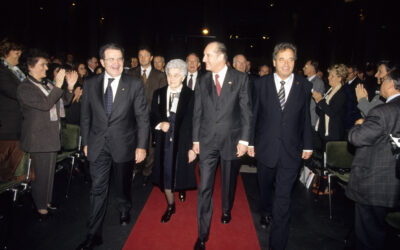Punta Alta is a vibrant city in southern Argentina, whose citizens are known for their initiative. It is the location of the Puerto Belgrano Naval Base, the largest port in the country, which saw its moment of glory a century ago as thousands of youths did their military service there while in the navy. Here in this city of 60,000 open and generous people, there is now a group for “dialogue among people of diverse convictions, friends of the Focolare. In order to open the experience of communication and dialogue to others, a cineforum series has been organized.  They did not opt for a theater or for the dark silence of a cinema theater. . . they went to Bar Centrale, the most famous bar in Punta Alta, which has been around for nearly 100 years with its typical little tables and grand lounge, pool tables and a small stage where, in the 1930’s small orchestras and dancers performed. The admission fee is one non-perishable food item that is donated to a local Community Center. “Invitations are made personally by email or by not so large but very visible posters, which have been prepared by the bar owner and hung in the windows of neighboring shops. Group size varies between 30 and 50 people,” explains Hector Correa, the passionate cinema expert of the group.
They did not opt for a theater or for the dark silence of a cinema theater. . . they went to Bar Centrale, the most famous bar in Punta Alta, which has been around for nearly 100 years with its typical little tables and grand lounge, pool tables and a small stage where, in the 1930’s small orchestras and dancers performed. The admission fee is one non-perishable food item that is donated to a local Community Center. “Invitations are made personally by email or by not so large but very visible posters, which have been prepared by the bar owner and hung in the windows of neighboring shops. Group size varies between 30 and 50 people,” explains Hector Correa, the passionate cinema expert of the group. Among the participants were students, adults, some young women Marine recruits in uniform, and also the regular clients of the bar were there willingly joining in with the gathering. When all was ready, the projection was preceded by a brief introduction which explained the meaning of the gathering and the motivation of the group that had organized the event. “Then,” Hector explains, “ my brother Luis and I” presented the film. And at the end we ran the debate, which always has a lot of participation and turns out to be very interesting for everyone. We don’t delve so much into the technical or aesthetic details of the film, but try to offer details about the thoughts and ideas of the film author, the presenation of characters and the historical context of the story. This makes the participants be more interested in the film’s content.”
Among the participants were students, adults, some young women Marine recruits in uniform, and also the regular clients of the bar were there willingly joining in with the gathering. When all was ready, the projection was preceded by a brief introduction which explained the meaning of the gathering and the motivation of the group that had organized the event. “Then,” Hector explains, “ my brother Luis and I” presented the film. And at the end we ran the debate, which always has a lot of participation and turns out to be very interesting for everyone. We don’t delve so much into the technical or aesthetic details of the film, but try to offer details about the thoughts and ideas of the film author, the presenation of characters and the historical context of the story. This makes the participants be more interested in the film’s content.”  “ “Putting the emphasis on reality and stories that have concepts and conceptions of the world within them, which often do not correspond to our ideas,” explains Sisi Deramo, “is an exercize that obliges you to first of all listen attentively to what the other is trying to express, and then to try to make yourself understood within the framework of a cordial and fruitful dialogue, so that the coming together of diverse opinions can enrich everyone and nourish the common understanding.” I asked Kiki Deramo which films had been chosen. “We chose films which we could then discuss: Cinema Paradiso, The Postman, The Truman Show, The Wall, directed by Alan Parker and Dead Poets Society. I don’t think we made the wrong choices.” “It was a very interesting and useful experience for everyone. Let’s hope we can do it again this year,” says Sisi. By Carlos Mana
“ “Putting the emphasis on reality and stories that have concepts and conceptions of the world within them, which often do not correspond to our ideas,” explains Sisi Deramo, “is an exercize that obliges you to first of all listen attentively to what the other is trying to express, and then to try to make yourself understood within the framework of a cordial and fruitful dialogue, so that the coming together of diverse opinions can enrich everyone and nourish the common understanding.” I asked Kiki Deramo which films had been chosen. “We chose films which we could then discuss: Cinema Paradiso, The Postman, The Truman Show, The Wall, directed by Alan Parker and Dead Poets Society. I don’t think we made the wrong choices.” “It was a very interesting and useful experience for everyone. Let’s hope we can do it again this year,” says Sisi. By Carlos Mana
Be recollected
Be recollected




0 Comments